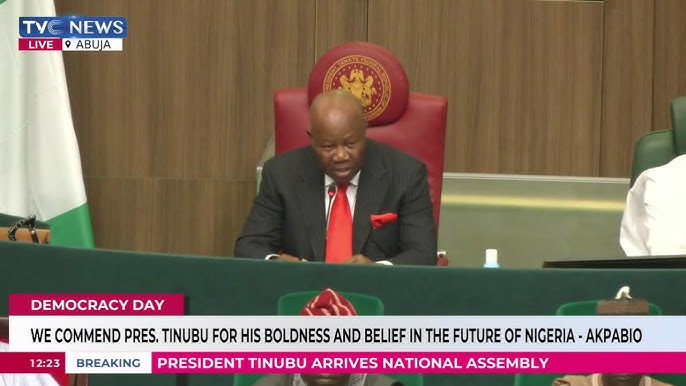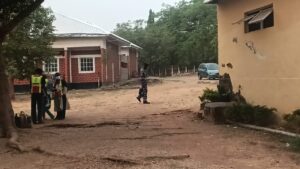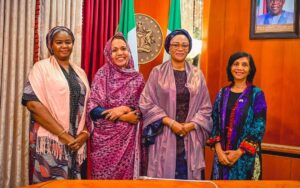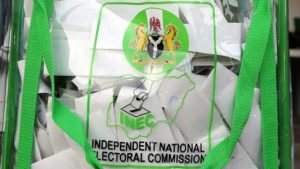Senate President Godswill Akpabio has urged Nigerians to renew their commitment to democratic values and national development, describing democracy not as a gift, but as a sacred trust that must be protected. He made the call on Wednesday in his welcome address at the joint sitting of the National Assembly, held in honour of President Bola Ahmed Tinubu’s Democracy Day State of the Nation address.
Speaking before a packed legislative chamber, Akpabio welcomed President Tinubu—whom he called “a veteran of the trenches” and “a symbol of democratic resistance”—back to the parliament, this time as Commander-in-Chief. He said Tinubu’s presence on the floor of the National Assembly was “nothing short of providence,” given his historic role in the fight for democracy.
“Today, we gather not to mourn injustice, but to honour resilience,” Akpabio declared. “We observe not the triumph of politicians, but the enduring faith of the Nigerian people in democracy—a faith that survived betrayal, braved teargas, defied armored tanks, and still chose the ballot over the bullet.”
Recalling the events of June 12, 1993, and the subsequent annulment of that year’s presidential election, the Senate President described the period as the point Nigeria “lost her innocence,” but also began a democratic awakening. He paid glowing tribute to the sacrifices of pro-democracy activists, students, journalists, and ordinary citizens who stood up against military rule and injustice.
Akpabio lauded Tinubu for his courage during those dark days, referencing his role in NADECO and his continued efforts to reform the country through bold policy decisions. “Under President Tinubu’s leadership, we have seen transformation in his bold approach to difficult reforms… this administration has not shied away from the hard decisions required to stabilize and grow our economy,” he said.
Highlighting the achievements of the 10th National Assembly, Akpabio noted that 844 bills have been introduced in just two years, with 96 passed and 52 already assented to by the President. He emphasized the importance of executive-legislative collaboration, saying, “Where governance is a partnership, progress follows. But where governance is a contest, the people suffer.”
As part of efforts to institutionalize the memory of Nigeria’s democratic journey, Akpabio proposed the creation of a June 12 Museum to serve as a living archive of the sacrifices that shaped the nation’s freedom.
In a powerful closing message, Akpabio called on citizens, civil society, and the media to play active roles in safeguarding democracy beyond elections. “To the youth, you must not treat democracy with apathy… To every Nigerian, democracy must not be reduced to election days. It must live in our values, our institutions, and our daily lives.”
The event marks 26 years of Nigeria’s return to democratic rule, and it also comes on the eve of the 10th Senate’s second anniversary. The Senate President concluded by reaffirming the legislature’s commitment to policies that uplift the poor, empower youth, and defend the nation’s democratic ideals.
Read full speech here
JUNE 12: THE FIRE THAT FORGED A NATION
WELCOME ADDRESS BY HIS EXCELLENCY, DISTINGUISHED SENATOR GODSWILL OBOT AKPABIO, GCON, PRESIDENT OF THE SENATE, FEDERAL REPUBLIC OF NIGERIA ON THE OCCASION OF THE 2025 DEMOCRACY DAY CELEBRATION AND THE STATE OF THE NATION ADDRESS BY HIS EXCELLENCY, SENATOR BOLA AHMED TINUBU, GCFR, PRESIDENT, COMMANDER-IN-CHIEF OF THE ARMED FORCES.
Protocol
On this hallowed floor where the voices of the people find expression through their representatives, we are deeply honoured to welcome Your Excellency, President Bola Ahmed Tinubu, GCFR, to the chambers of the National Assembly. Your presence here rekindles the memory of a long and courageous journey—marked by struggle, sacrifice, and an unyielding belief in the ideals of democracy. That you, Mr. President—a veteran of the trenches, a symbol of democratic resistance, and a beneficiary of the people’s trust—now stand before us to speak from the Parliament of the people, is nothing short of providence..
The National Assembly is proud to host you—our President, our compatriot, and one of our own—as you fulfill the solemn constitutional duty of addressing the nation. This chamber honours you not merely as the President, but as one of the architects of the very democratic foundation we commemorate today.
Today, we gather not to mourn injustice, but to honour resilience. We observe not the triumph of politicians, but the enduring faith of the Nigerian people in democracy—a faith that survived betrayal, braved teargas, defied armored tanks, endured silence, and still chose the ballot over the bullet.
On June 12, 1993, the torch of the long march to freedom was lit. Nigerians stood up to say: “Our voice matters. Our vote counts.”
However, the light was extinguished on June 24, 1993, when a terse statement declared that the will of the Nigerian people—freely expressed in the historic June 12 Presidential Election—had been annulled. Tears, rage, and hope poured into the streets.
Nigeria did not just lose an election; she lost her innocence. And across the country, the silence of shock was broken by the roar of resistance. The people rose. Angry students marched. Journalists spoke. Mothers wailed. Workers downed tools. Fathers stood before tanks. And young men and women—whose only crime was believing in democracy—laid down their lives. They died because they loved
Nigeria enough to fight for her soul. This was not just a rejection of oppression, but the beginning of a national awakening—signifying a rebirth as well as a reckoning.
The intro of Chief Moshood Abiola campaign song captured the spirit of that day: “Nigeria on the march again.” Indeed, Nigeria was on the march—towards democracy. But that cruel announcement turned the march for democracy into a march for justice.
Many, including Your Excellency, stood tall in those days of darkness. While others chose silence or compromise, you chose courage. At great personal cost, NADECO which you were part of, helped sustain the flame of liberty when it was most at risk of going out.
So as we mark this day, let us remember those who bled so we could vote. Those who took risks so we could speak. Those who were buried so that freedom might rise. Let us also pay tribute to all those who played pivotal roles in Nigeria’s democratic transition.
This year’s theme—“26 Years of Democracy: Renewing Our Commitment to National Development”—is not a slogan. It is a call to purpose. A reminder that democracy is not an end, but a means to national transformation.
Under President Tinubu’s leadership, we have seen transformation in his bold approach to difficult reforms. From unifying the foreign
exchange market, to local government autonomy, to the formation of the regional development commissions, to Nigerian Education Loan Fund, to removing fuel subsidies, to attracting foreign investments, to tax reforms, this administration has not shied away from the hard decisions required to stabilize and grow our economy. These efforts are gradually restoring investor confidence, laying the foundations for long-term prosperity, and refocusing government expenditure toward productive investments. Mr President we commend you for your boldness, your vision, and your unwavering belief in Nigeria’s future.
Likewise, the 10th National Assembly, which marks its 2nd Anniversary tomorrow, June 13, 2025 has played its part with diligence and distinction. From its inception, the 10th Senate demonstrated a renewed vigor for addressing the country’s complex challenges through purposeful legislation. This commitment is reflected in its extraordinary output: a total of 844 bills have been introduced within its first two years—an unprecedented figure that underscores the Senate’s proactive posture in tackling pressing national issues.
Out of this impressive volume, 107 bills are currently at the committee stage, undergoing the necessary scrutiny and stakeholder engagement that ensures quality legislation, 206 bills are awaiting first reading, reflecting a robust pipeline of legislative ideas prepared for formal introduction, and 409 bills have advanced to second reading.
Notably, the Senate has passed 96 bills, a record for any Nigerian Senate at this stage of the legislative cycle. Even more significantly, 52 of these bills have been assented to by the President, translating into enforceable laws that will shape governance, economic development, public welfare, and national security. These bills include the National Education Fund, local government autonomy bill, regional development commissions, tax reforms, universities and tertiary institutions, agricultural institutions etc.
Moreover, the Tenth Senate has acted decisively on 26 Executive Bills, showcasing a healthy balance of cooperation and oversight in its engagement with the executive arm. These executive-sponsored legislations address key policy areas and benefit from the Senate’s thorough review and refinement before passage.
Beyond bills, the 10th Senate has received a total of 80 petitions from citizens and civil society. This is a testimony to public trust in the institution. Of these, 18 petitions have been fully adopted, providing redress, transparency, and institutional accountability.
History teaches us that nations make the greatest progress when the Executive governs with vision, and the Legislature guides with wisdom. But they prosper most when both walk hand-in-hand—not as rivals, but as co-stewards of national trust.
In the United States, the civil rights Act, and the space race were all made possible through executive-legislative collaboration. In Rwanda and Ghana, transformation was achieved through shared resolve between these two arms of government. In South Africa, Mandela’s dream was realized through executive-legislative collaboration.
The lesson is clear: where governance is a partnership, progress follows. But where governance is a contest, the people suffer. Therefore as we commemorate 26 years of uninterrupted democratic governance, we must renew our national commitment to foster collaboration between the different arms of government.
Democracy is not a gift. It is a trust we must protect. To the youth, you must not treat democracy with apathy. To civil society, you must not let memory fade. To the media, we must be held accountable through responsible journalism. And to every Nigerian, democracy must not be reduced to election days. It must live in our values, our institutions, and our daily lives.
Let us preserve the memory of June 12. I respectfully urge Mr. President to consider the establishment of a June 12 Museum—a living archive where the stories, artifacts, struggles, and sacrifices of the democratic movement will be housed, preserved, and taught. Nations that forget their past lose the moral compass for their future.
As President of the Senate, I reaffirm the unwavering commitment of the 10th National Assembly to the cause of the Nigerian people. We will continue to champion every policy that uplifts the poor, empowers our youth, strengthens our economy, and defends the dignity of every citizen and the nation
We owe it to those who fought.
We owe it to those who fell.
We owe it to those who still believe.
May we never again betray the hope that was once betrayed.
And may we never lose the freedom that was once denied.
Once again, Mr. President, welcome home—to this Chamber, which is not only the heartbeat of our democracy, but your political home. We now have the honour to invite you to address this Assembly, and through us, the great people of the Federal Republic of Nigeria.
God bless the Federal Republic of Nigeria.
God bless our democracy.





